- Home
- Merrie Destefano
Lost Girls
Lost Girls Read online
Table of Contents
Copyright
Dedication
PART ONE
Chapter One
Chapter Two
Chapter Three
Chapter Four
Chapter Five
Chapter Six
Chapter Seven
Chapter Eight
Chapter Nine
Chapter Ten
Chapter Eleven
Chapter Twelve
Chapter Thirteen
Chapter Fourteen
Chapter Fifteen
Chapter Sixteen
Chapter Seventeen
Chapter Eighteen
Chapter Nineteen
Chapter Twenty
Chapter Twenty-One
Chapter Twenty-Two
Chapter Twenty-Three
Chapter Twenty-Four
PART TWO
Chapter Twenty-Five
Chapter Twenty-Six
Chapter Twenty-Seven
Chapter Twenty-Eight
Chapter Twenty-Nine
Chapter Thirty
Chapter Thirty-One
PART THREE
Chapter Thirty-Two
Chapter Thirty-Three
Chapter Thirty-Four
Chapter Thirty-Five
Chapter Thirty-Six
Chapter Thirty-Seven
Chapter Thirty-Eight
Chapter Thirty-Nine
Chapter Forty
Epilogue
Acknowledgments
Author’s Note
About the Author
More from Entangled Teen
LOST GIRLS
by
Merrie Destefano
This book is a work of fiction. Names, characters, places, and incidents are the product of the author’s imagination or are used fictitiously. Any resemblance to actual events, locales, or persons, living or dead, is coincidental.
Copyright © 2016 by Merrie Destefano. All rights reserved, including the right to reproduce, distribute, or transmit in any form or by any means. For information regarding subsidiary rights, please contact the Publisher.
Entangled Publishing, LLC
2614 South Timberline Road
Suite 109
Fort Collins, CO 80525
Entangled Teen is an imprint of Entangled Publishing, LLC.
Visit our website at www.entangledpublishing.com.
Edited by Heather Howland
Cover design by Louisa Maggio
Interior design by Toni Kerr
ISBN: 9781633756052
Ebook ISBN: 9781633756069
Manufactured in the United States of America
First Edition January 2017
10 9 8 7 6 5 4 3 2 1
Dedicated to my friend, Rachel Marks,
who believed in this book from Day One, Page One.
Chapter One
I remember last night perfectly.
I know what we ate for dinner. I know my little brother didn’t do his homework. I know Dad drove me to my ballet lessons, then waited for me in the Starbucks across the street.
I know that, later in the evening, I fell asleep when I was supposed to be studying geometry, my earbuds in while I listened to Taylor Swift’s latest album.
That was my yesterday.
The problem is, everyone, from my parents to my teachers to the police, says that stuff didn’t happen yesterday.
It happened last year.
I went to sleep with music playing, curled up on my bed, and wrapped in the afghan Grams knitted for me when she was on chemo.
I woke up in a ditch, half-buried in a pile of leaves. I was shivering and wet, a soft rain falling, icy drops hitting me in the face and running down my neck. Trees towered overhead, black branches scratching the sky, wind howling, and from somewhere nearby came the muted sounds of traffic.
I sat up, confused and scared, grogginess giving way to an intense adrenaline rush.
Then I screamed, louder than I thought I could. The sound ripped out of my lungs and wouldn’t stop; it went on and on until I thought I would collapse because I knew I couldn’t breathe and scream at the same time. And then—when I was sure I would fall forward, bent over at the waist, my lungs empty and spots dancing before my eyes—then I found some way to yell again. At first my shouts were primal and there were no words, just terror and pain and a black pit in my stomach that wouldn’t allow me to have conscious thoughts.
I began to cry the same thing, over and over.
“Help! Somebody help me!”
I tried to stand, but the gully was so slanted that I kept falling back to my knees, every stumble forcing me to become aware of another injury—the raw skin on my wrists and ankles, covered with dried blood and stinging with each drop of rain; the muscles in my legs sore and weak, like I’d been running for days; the soles of my feet aching, my tennis shoes ripped and stained with mud.
I stretched out my arms, latching onto tree roots to gain my balance, and I pulled myself up the incline, foot by foot. Fingers now coated with mud, I perched on the edge of a highway, nearly blinded by headlights whenever a car sped past.
There I stood, waving my arms and screaming again, not knowing that my hair was matted or that there was blood and dirt on my clothes or that my photo had been on the news for the past two weeks.
Lost girl. Disappeared on her way home from school. Anyone with information, please contact the Santa Madre police department.
Two cars drove past, headlights splashing me with brilliant light. I hadn’t realized until now that the sun tipped on the edge of the world, ready to disappear, or that twilight shadows were already stretching across the horizon. Great pockets of violet darkness yawned between each pair of lights that hurtled toward me, greedy fingers of darkness that wanted me to tumble back into that gully and remain hidden.
Please, somebody stop and help me.
I was screaming again and some sort of weird survival panic took over.
I walked into the middle of the two-lane southbound road and stood there.
Go ahead, run me over. I dare you.
Wait, what was I doing?
Several cars spun to a stop, skidding sideways, tires squealing, metal crashing metal and rubber burning. The old me, the girl who fell asleep listening to Taylor sing about a broken heart, never would have done this. What was wrong with me?
My heart thundered in my chest, but I refused to move, even when the wreckage screeched closer and closer, fenders crunching, bumpers twisting, windshields shattering. I stared all the passengers in the eye, glancing from one face to the next, coolly noting that none of them were hurt—nothing beyond a bump or a bruise.
You. Will. Stop. And. Help. Me.
Still the wreckage surged forward. I merely lifted one hand, palm up, signaling for them to stop. Like I was a traffic cop or something.
Everything finally slid to a stop, a few feet away from me.
Tears coursed down my cheeks and I began to shake uncontrollably. I sank to my knees, truly myself again. Frightened and alone and lost.
“Help me,” I begged, then buried my face in my hands.
Car doors opened. A strange cacophony of voices tumbled out, some yelling, some speaking in hushed tones.
“What’s going on?”
“Is that the missing girl from the news?”
“9-1-1, we have an emergency here—”
“Honey, you’re gonna be okay, don’t worry—”
An elderly woman with white hair and bright, pink lipstick pulled me close and draped her coat over me. When I glanced up I saw blood on her forehead, but she didn’t seem worried about herself. She smiled down at me, her face a map of connected wrinkles.
“We’re gonna get you home to your parents,” she said. �
�Do you want to call them?” She handed me her cell phone, but my fingers were shaking too much to dial. I told her the number and she punched it in, waiting while it rang. When a voice answered on the other end, the white-haired woman said, “I have someone who wants to talk to you.” Then she handed me the phone.
“Hello? Who is this?” It was my mom, a frantic tone in her voice that brought fresh tears to my eyes.
My voice came out shakier than I expected.
“Mom?”
Neither one of us could talk, not for a long time, because we were both crying. Then she finally whispered my name, like it was a magical word that could change the world.
“Rachel? Rachel, baby, where are you?”
I looked around. “I don’t know.”
“You’re on the 39, just north of Azusa,” the white-haired woman told me.
Flashing lights spun in the distance and sirens blared. An ambulance and a fire truck and two police cars were headed toward us. I blinked at the brightness, shielding my eyes with one hand.
“Rachel? Are you still there?” It was my father’s voice now, calling me back to the cell phone.
I pressed it against my ear. “Daddy?”
“Honey, when the ambulance gets there, you get inside and you stay there. Do you hear me? Don’t get in a car with anyone else!”
“I will—I mean, I won’t. I’ll go with the paramedics.” My teeth were chattering and I was shivering so much I could hardly hold the phone. I think I may have started talking gibberish, half-sentences with little meaning. I remember saying something about my geometry test and worrying that I wouldn’t make it to class tomorrow and I may have mentioned something about my biology class, too, because Dad interrupted me.
“Rachel, are you talking about the class you took with Miss Wallace?”
“Yeah. She always gives exams on Wednesday.”
There was a long silence. I wondered if we had gotten cut off. Meanwhile, the ambulance doors opened and someone wheeled a stretcher toward me.
“Honey, you had geometry with Miss Wallace last year. When you were a sophomore.”
I frowned. “But I’m a sophomore now.”
“Baby girl, you’re a junior. Don’t worry about it. All this will get straightened out when you get home—”
I dropped the phone. My hands were shaking too much to hold it. I glanced down at my hands, at the chipped red nail polish. But I hadn’t been wearing nail polish last night and I never use this color. I turned my hands over and discovered a tattoo on my inner wrist.
A tattoo?
Always and forever. That’s what it said. But there was no redness or swelling. I didn’t get this tattoo anytime recently.
The paramedics helped me onto the stretcher, and then the world was rushing past me, rain falling on my face, people staring down at me as the stretcher wheeled by, the air thick with the smell of oil and gasoline and burned rubber. Then another smell came suddenly and violently—a memory.
A thick, cloying scent of pine and cedar.
My stomach lurched and I couldn’t stop.
I started screaming again.
Chapter Two
I didn’t recognize myself.
When I went to sleep last night, my hair had been dark brown and shoulder-length. Now it was cropped short and dyed platinum blond. My face looked longer and thinner, my cheekbones more pronounced. I looked away from the mirrored wall on my left and focused on the man sitting across from me instead.
FBI agent Ryan Bennet.
Any other time I would have thought it was cool to be alone with a guy like this. About ten years older than me, he looked like a stunt double for Channing Tatum. Cool green eyes studied me, a pensive expression on his face. He glanced down at his notes, tapping his pen on the table between us.
“You don’t remember anything about where you were for the past two weeks?”
He’d asked this before. I’d already answered it.
I sighed. I wanted to go home.
“There was a smell. Like a forest, maybe. Pine and cedar. That’s all.”
“Could that smell have been a man’s cologne?”
I shrugged. “Maybe.”
“The last thing you remember is…”
“Going to bed and listening to music.”
“And your current class schedule is...” He began naming all my sophomore classes, reading a list I had written down a few minutes ago.
I nodded.
“You don’t remember taking chemistry or Algebra II?”
“Are you kidding?” There’s no way I was in Algebra II. I hadn’t even mastered geometry yet. I was still worried Miss Wallace was going to flunk me.
He shifted in his chair, then shot a quick glance at the mirror, maybe wishing he could talk to whoever was on the other side. “There’s one other thing we haven’t discussed yet.”
An unwelcome shudder raced over me. I already knew that I hadn’t been raped. I’d spent hours with a woman doctor while she gently poked and prodded me, asking me questions. When she was drawing my blood, both of us had been puzzled by the marks on my inner arms.
Needle marks.
Either I was a druggie, which just couldn’t be true, or someone had been injecting something into me. The tricky thing was, some of those track marks looked a lot older than two weeks. Now I had a possible threat of withdrawal hanging over my head, with symptoms that could range from headaches to night terrors to tremors.
Across from me, Agent Bennet opened a large manila envelope, one that had been sitting conspicuously beside him throughout our interview. He slid out several photographs, all eight-by-ten glossies—each one catching his attention for a moment and causing his brow to lower—and then he slapped them down on the table, lining them up in a row so they faced me. They were all shots of girls about my age, each one with different hair and eye and skin color, each one smiling into the camera, like they were expecting something wonderful to happen. These had to be yearbook photos, because every hair was perfect, every girl was staring right at me.
All of them waiting for something.
I glanced up at Agent Bennet, wondering what he wanted.
“Do you know any of these girls?” he asked.
I ran a gaze over them again, imagining them stretching on the barre, wearing one-piece black leotards, or running down the hall at Lincoln High, wearing jeans and T-shirts, backpacks slung over their shoulders. Six girls looked up at me, wanting me to know their names, but I was lucky to remember my own name right now.
I shook my head. “Who are they?”
He started listing them off as if they were his younger sisters; every time he touched a photo he would say the girl’s name and his jaw would shift, just a fraction, as if the muscle was working too hard. As I expected, he said six names I didn’t recognize—Emily, Hannah, Madison, Nicole, Haley, and Brooke—then he spoke again, still staring down at their faces.
“All these girls have gone missing within the past three months. Two of them disappeared after school, like you did. Three left home for sporting events but never came back. One girl told her mother she was spending the weekend with a friend, but the friend waited and waited. The girl never showed up.”
He paused, then looked directly into my eyes, watching me so closely that a trickle of sweat began to run down my neck. “You’re the only girl who has come back,” he said, leaning forward. “How did you get away?”
How was I supposed to know? My skin started to heat up, a feeling of being trapped started to overwhelm me, and my breathing turned ragged and raw. I needed to get out of here.
I shook my head, my stomach roiling. “I don’t remember.”
“There were pine needles stuck to your clothes, Rachel, and seedpods that can only be found in the San Gabriel Mountains. Could someone have been holding you captive in the mountains?”
That smell of cedar and pine came back, as if he had conjured it. It wafted around me, oozing out of the floorboards and the seams where the walls
met. It curled like smoke away from the mirror until foggy clouds covered the floor. I fought a gag reflex, holding my right hand over my mouth. Without realizing it, I pushed my chair backward, accidentally knocking it to the floor with a loud crash. I struggled to my feet.
At the same time, the door behind me clicked and swung open. A woman dressed in a navy blue suit looked in at us, a stern expression on her face as she glanced from me to Agent Bennet. “That’s enough for today, Bennet. In fact, it’s enough, period. Miss Evans can go home now. Her parents have been waiting for more than an hour.”
One hand still over my mouth and nose, trying to block out the stench of pine and cedar, I stumbled past her, heading down the hallway. But no matter how fast I walked, I could still hear the two of them arguing.
“You will not follow this line of questioning any further, do you understand, Bennet?” the woman was saying. “This girl has been traumatized enough.”
“But there’s something here that connects these cases. I’m sure of it. Something we’re overlooking—”
“Half of these girls are probably runaways. There’s not enough evidence to prove they fall into the category of Violent Crimes Against Children, or that these cases are related—”
The farther I walked away from them, the more their voices faded, which was what I wanted. I could see Mom and Dad and Kyle through a large glass window up ahead, all of them waving at me, big smiles on their faces like we were going to Disneyland.
The two agents behind me probably hadn’t realized that I could still hear them. It was like I was invisible. I tried to ignore them and forget about what might have happened during that two-week period when I was lost.
Except now, after talking to that FBI agent, I knew that I wasn’t the only one. There were other girls out there who had gone missing, too.
And they were still lost.
Chapter Three
We all piled into Dad’s SUV and headed away from the FBI’s Los Angeles Field Office. Dad drove while Mom sat in the front passenger seat, chewing her fingernails, staring out the window, occasionally saying something overly cheerful like, we need to take a family vacation or isn’t the weather gorgeous today? Dad didn’t say much. He’d been a lot quieter since his last tour in Afghanistan, right before he retired from the Navy last year. A new Taylor Swift song played on the radio, one I didn’t recognize—apparently she’d released another album during my missing year. Cars drove past that I’d never seen before, some new model of Mini-Coop and a sporty-looking Kia.

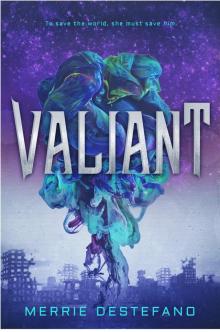 Valiant
Valiant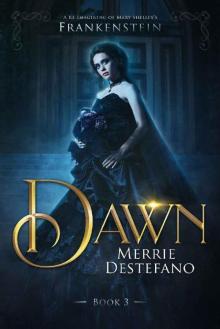 Dawn: A Re-Imagining of Mary Shelley's Frankenstein (The Frankenstein Saga Book 3)
Dawn: A Re-Imagining of Mary Shelley's Frankenstein (The Frankenstein Saga Book 3)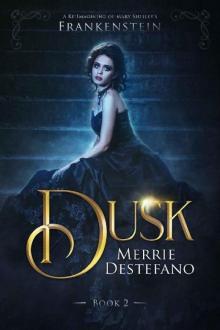 Dusk: A Re-Imagining of Mary Shelley's Frankenstein (The Frankenstein Saga Book 2)
Dusk: A Re-Imagining of Mary Shelley's Frankenstein (The Frankenstein Saga Book 2)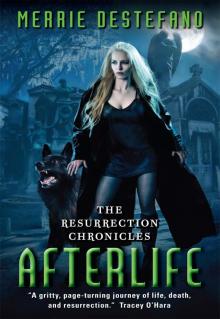 Afterlife
Afterlife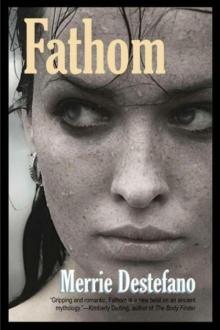 Fathom
Fathom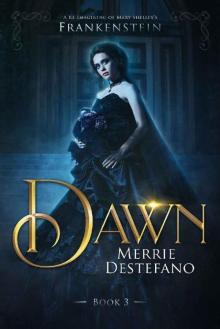 Dawn_A Re-Imagining of Mary Shelley's Frankenstein
Dawn_A Re-Imagining of Mary Shelley's Frankenstein Shade: A Re-Imagining of Mary Shelley's Frankenstein (The Frankenstein Saga Book 1)
Shade: A Re-Imagining of Mary Shelley's Frankenstein (The Frankenstein Saga Book 1)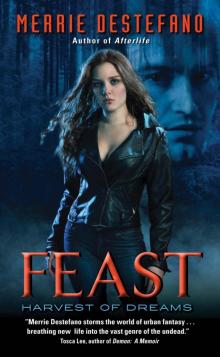 Feast
Feast Lost Girls
Lost Girls Dawn
Dawn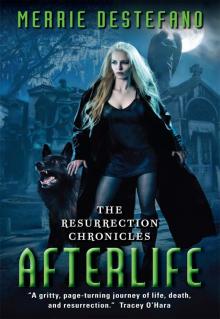 Afterlife: The Resurrection Chronicles
Afterlife: The Resurrection Chronicles Shade_A Re-Imagining of Mary Shelley's Frankenstein
Shade_A Re-Imagining of Mary Shelley's Frankenstein Fairytale Christmas
Fairytale Christmas